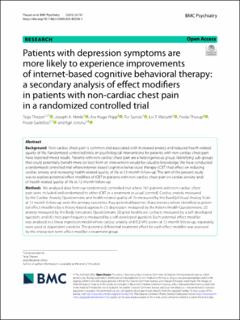| dc.contributor.author | Thesen, Terje | |
| dc.contributor.author | Himle, Joseph A. | |
| dc.contributor.author | Pripp, Are Hugo | |
| dc.contributor.author | Sunde, Tor | |
| dc.contributor.author | Walseth, Liv Tveit | |
| dc.contributor.author | Thorup, Frode | |
| dc.contributor.author | Gallefoss, Frode | |
| dc.contributor.author | Jonsbu, Egil | |
| dc.date.accessioned | 2024-03-14T09:19:36Z | |
| dc.date.available | 2024-03-14T09:19:36Z | |
| dc.date.created | 2023-10-31T10:58:19Z | |
| dc.date.issued | 2023 | |
| dc.identifier.issn | 1471-244X | |
| dc.identifier.uri | https://hdl.handle.net/11250/3122321 | |
| dc.description.abstract | Background
Non-cardiac chest pain is common and associated with increased anxiety and reduced health-related quality of life. Randomized controlled trials on psychological interventions for patients with non-cardiac chest pain have reported mixed results. Patients with non-cardiac chest pain are a heterogeneous group. Identifying sub-groups that could potentially benefit more (or less) from an intervention would be valuable knowledge. We have conducted a randomized controlled trial where internet-based cognitive behavioural therapy (iCBT) had effect on reducing cardiac anxiety and increasing health-related quality of life at 12-month follow-up. The aim of the present study was to explore potential effect modifiers of iCBT in patients with non-cardiac chest pain on cardiac anxiety and/or health related quality of life at 12-month follow-up.
Methods
We analysed data from our randomized, controlled trial where 161 patients with non-cardiac chest pain were included and randomized to either iCBT or a treatment as usual (control). Cardiac anxiety measured by the Cardiac Anxiety Questionnaire and health-related quality of life measured by the EuroQol Visual Analog Scale at 12 month follow-up were the primary outcomes. Four potential baseline characteristics where identified as potential effect modifiers by a theory-based approach: (1) depression measured by the Patient Health Questionnaire; (2) anxiety measured by the Body Sensations Questionnaire; (3) prior healthcare contacts measured by a self-developed question; and (4) chest pain frequency measured by a self-developed question. Each potential effect modifier was analysed in a linear regression model where cardiac anxiety and EQ-VAS scores at 12-month follow-up, separately, were used as dependent variables. The potential differential treatment effect for each effect modifier was assessed by the interaction term: effect modifier x treatment group.
Results
Depression symptoms at baseline predicted a differential treatment effect at 12-month follow-up on health-related quality of life in favor of the iCBT group (regression coefficient of the interaction term: -1.85 (CI -3.28 to -0.41), p = 0.01), but not on cardiac anxiety at 12-month follow-up. Fear of bodily symptoms, chest pain frequency and prior health care contacts at baseline did not predict a treatment effect on either health-related quality of life or cardiac anxiety.
Conclusions
Depression symptoms at baseline predicted a positive treatment effect of iCBT on health-related quality of life in patients suffering from non-cardiac chest pain. This indicates that it is important to identify patients with non-cardiac chest pain and co-occurring depression symptoms given that they are particularly likely to benefit from iCBT. | en_US |
| dc.language.iso | eng | en_US |
| dc.publisher | BMC | en_US |
| dc.rights | Navngivelse 4.0 Internasjonal | * |
| dc.rights.uri | http://creativecommons.org/licenses/by/4.0/deed.no | * |
| dc.title | Patients with depression symptoms are more likely to experience improvements of internet-based cognitive behavioral therapy: a secondary analysis of effect modifiers in patients with non-cardiac chest pain in a randomized controlled trial | en_US |
| dc.type | Journal article | en_US |
| dc.type | Peer reviewed | en_US |
| dc.description.version | publishedVersion | en_US |
| dc.rights.holder | Copyright 2023 The Autors(s) | en_US |
| dc.source.articlenumber | 751 | en_US |
| cristin.ispublished | true | |
| cristin.fulltext | original | |
| cristin.qualitycode | 2 | |
| dc.identifier.doi | 10.1186/s12888-023-05238-1 | |
| dc.identifier.cristin | 2190396 | |
| dc.source.journal | BMC Psychiatry | en_US |
| dc.identifier.citation | BMC Psychiatry. 2023, 23 (1), 751. | en_US |
| dc.source.volume | 23 | en_US |
| dc.source.issue | 1 | en_US |

